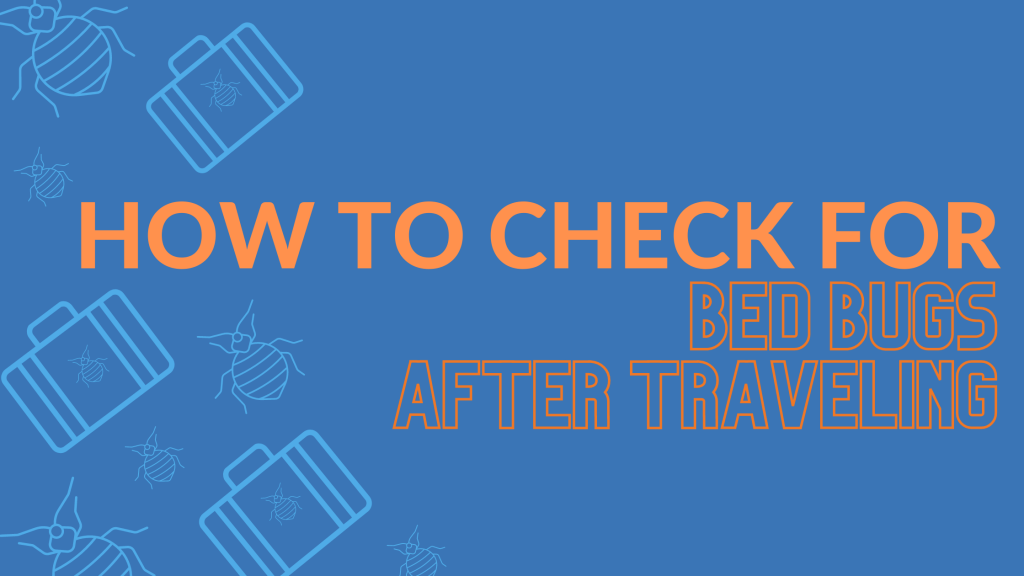How To Check For Bed Bugs After Traveling

When you’re on vacation the last thing on your mind is probably the thought of picking up bed bugs in your hotel or rental home. Unfortunately, the reality is that bed bugs can hide out in mattresses, bed frames, and other parts of a room just waiting for new guests to check-in. Don’t worry, though, there are a few things you can do to check bed bugs after traveling. Here’s how to prevent bed bugs from hitchhiking back into your home!
What To Do When You Get To Your Hotel
Don’t set your luggage directly on the bed
Keep your suitcase in the hall or doorway until you’ve thoroughly inspected the bedding. Bed bugs can easily jump into your suitcase and be carried back into your home via your luggage if you’re not careful. Prevent this in advance by ensuring your luggage doesn’t come into contact with bedding that may be hiding bed bugs.
Check the bedding in which you’ll be sleeping
Pull back the sheets of your bed and inspect the mattress seams, particularly the corners, for noticeable small black fecal stains from bed bugs. These stains may look like little black pen dots, which are especially noticeable on white or light colored sheets.
Check the rest of the room
After you’ve checked the bedding, be sure to inspect the rest of the room before unpacking. This includes behind the headboard of the bed and in/around sofas and chairs (pull up cushions, if possible). Use your phone flashlight to help you with your inspection.
If you notice any signs of bed bugs (including fecal spots or an actual bug itself), alert staff or the homeowner and change rooms immediately. Do not stay in any rooms adjacent to the infested room!
What To Do When You Get Back Home
Quarantine your luggage
Bed bugs are very small and their eggs are sticky so they can make their way back home with you even if you didn’t see signs of bed bugs in your hotel. Because of this, it’s important to quarantine your luggage away from the rest of your home when you get back from your vacation.
Unpack your suitcase, putting clothes in plastic bags and tying up the bags before bringing them inside your home to wash. Leave your suitcase and any other luggage outdoors and immediately wash and dry your clothes on high heat to kill any hitchhikers. Vacuum the outside and inside of your luggage and bags and thoroughly inspect them before bringing them back into your home.
Be proactive about prevention
If you’re someone who travels frequently, it may be wise to use Cimexa* or Diatomaceous Earth to create a protective barrier around your own bed that will prevent bed bugs after traveling. Use a small brush to apply either product to the feet of your bed frame and just under your mattress (do not apply to the side of the mattress you sleep on).
If an invading bed bug comes into contact with the Cimexa or DE, the dusts work by destroying the bed bug’s exoskeleton and absorbing moisture and oils off the pest. With Cimexa, this causes the bed bug to rapidly die from dehydration, often within just 24 hours. With DE, it may take the bed bugs coming into the product multiple times or longer (anywhere from 7 to 17 days) to experience dehydration from the product.
Once applied, the Cimexa will last up to 10 years if undisturbed. This is a simple, cost-effective way to be proactive in protecting your home from bed bugs. Another option is to invest in interceptors* which go under the feet of your bed. These work by trapping any bed bugs that try to make their way from your suitcase up into your bed.
*Note: With any store-bought product you use for pest prevention, be sure to read the instruction label carefully and apply exactly as instructed, using the correct PPE, to prevent misuse and harm to yourself or other household members.
Dealing a bed bug infestation?
If you’re one of the unfortunate people who accidentally gets bed bugs after traveling, give go2-pros pest control a call ASAP!
Bed bugs are one of the toughest pests to eradicate and extermination of these bugs should not be a DIY endeavor!
Getting a licensed pest control professional into your home to address the issue immediately will help quickly stop an infestation before it becomes spreads throughout the entirety of your home.
